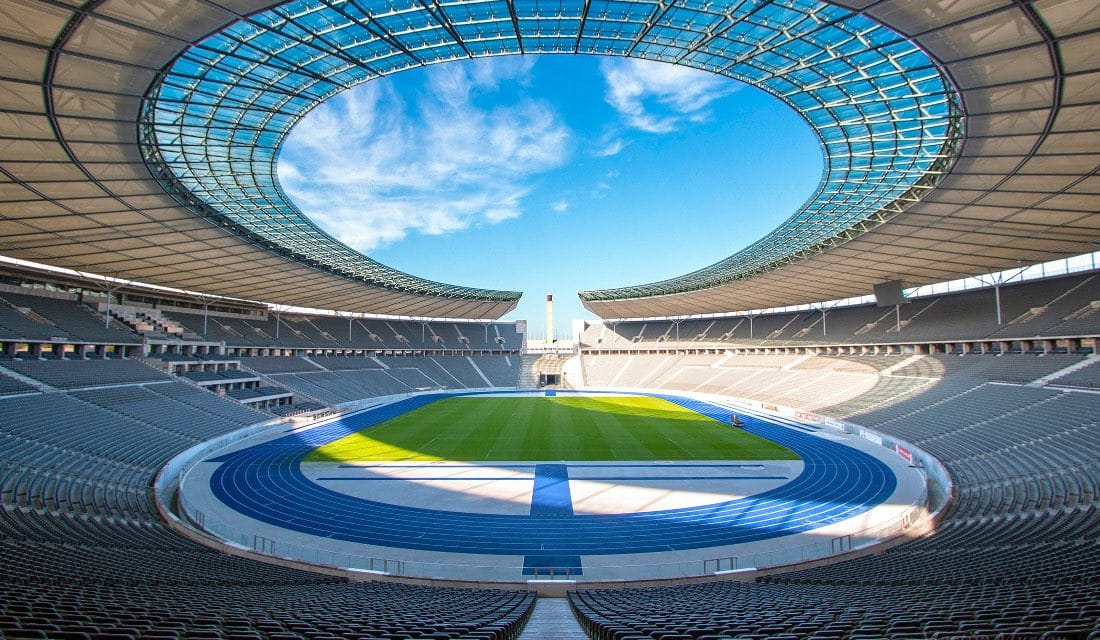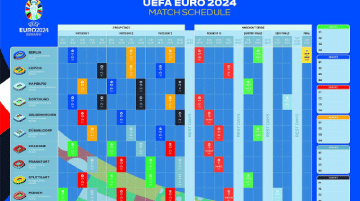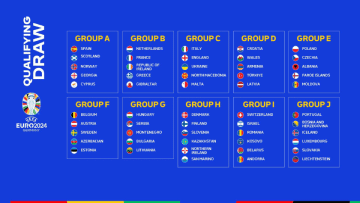As a top-tier footballing nation, with the Bundesliga being one of the world’s most professional leagues, Germany is a perfect host for the centerpiece that is EURO 2024. One of the benefits of having such an advanced football nation host the event is that very little needs building or structuring. Superb transport, hotels, amenities, and, of course, excellent world-class stadia are already ready and waiting for the summer’s twenty-four competitors.
Where will the action be taking place, though? Join us as we explore and explain all ten stadiums set to feature in EURO 2024. First, though, let’s showcase some of the top Bitcoin bookmakers covering all the action pitch-side.
The Best Bitcoin Bookmakers for EURO 2024 Betting
EURO 2024: Willkommen in Deutschland
EURO 2024 is set to be staged in Germany. The summer showpiece will feature some of Europe’s finest, most beautiful cities, with excellent and efficient transport helping millions of football fans zip between them to watch the continent’s best national sides. Which cities are playing host to games, though, and which stadia are involved? Just us as we explain all below.
The Host Cities
Germany has selected ten of its finest cities to host EURO 2024 games. These include Berlin, Cologne, Dortmund, Düsseldorf, Frankfurt, Gelsenkirchen, Hamburg, Leipzig, Munich, and Stuttgart. Many of these cities have played host to European Championships, continental club competitions, and even a FIFA World Cup or two in the past, so they are no strangers to major events and well-versed in staging EURO 2024.
Where Does the First Match Take Place?
The opening ceremony and first Group Stage match features hosts Germany and takes place on Friday, June 14th. This game will take place in FC Bayern Munich’s Allianz Arena, which, for sponsorship reasons, has been renamed the Fußball Arena München, or Munich Football Arena for the competition.
The EURO 2024 Final
Where else could the final take place but in the German capital? Berlin will play host to the showpiece final on July 14th. The Olympiastadion in Berlin will support the game. The Category 4 stadium hosted the 1936 Olympic Games, Group Stages in the 1974 FIFA World Cup, and the final in the 2006 event. It is well-prepared to host such a prestigious tournament.

What About Team Bases?
It’s too early to say where each team will be based. Teams will generally be given several options to choose from. Some may make their selections based on the distance from their camp to each Group Stage match, while others may make their base close to stadiums with the best training facilities.
Introducing the EURO 2024 Stadiums
Germany has world-class football stadiums which play host to top-tier league football. Unlike recent football competitions, which have been staged in countries relatively new to football, nothing needs building. There are plenty of 30,000 minimum capacity stadiums (a UEFA requirement), along with hydro pools, excellent training facilities, state-of-the-art fan zones, hotels, and transport.
If you’re a keen football fan and follow the Bundesliga, you will notice that some German stadiums have been renamed for the event. This common occurrence happens before almost every major international football tournament and is done to ensure that the stadium’s sponsors don’t clash with those brands sponsoring EURO 2024. Some of the EURO 2024 stadiums are also operating at reduced capacities for the main event, either because they would ordinarily feature standing sections or because boxes have been taken by UEFA officials, TV studios, or others attending the game in a capacity other than a general spectator or fan.
With that said, let’s explore the ten stadiums that EURO 2024 is going to call home.
Featured Bitcoin EURO 2024 Betting Site
BC.Game Welcome Bonus
180% up to $20,000 First Deposit Bonus
Arena AufSchalke, Gelsenkirchen
Ordinarily known as the Veltins-Arena, the renamed Arena AufSchalke in Gelsenkirchen is, of course, home to FC Schalke 04. It will support 50,000 spectators during EURO 2024 during three Group Stage games and one Round of 16 tie. It does feel as though this magnificent stadium is being underused, given that it has been home to the 2004 UEFA Champions League final before and was memorably the home of the 2006 World Cup Quarterfinal when Portugal beat England on penalties.
BVB Stadion, Dortmund
Better known as the Signal Iduna Park, this 66,000-capacity stadium is home to one of the Bundesliga’s most successful teams, BV Borussia Dortmund. It is no stranger to hosting major events, having supported European Championship and World Cup games before, alongside the 2001 UEFA Cup Final. This time around, Dortmund’s stadium will host four Group Stage games, one Round of 16 event, and be used for a Semi-Final.
Cologne Stadium, Cologne
The rather dull-title Cologne Stadium is the makeshift name for 1.FC Köln’s RheinEnergieStadion. At 47,000 seats, it’ll be a prime location to watch four Group Stage games and one Round of 16 event during EURO 2024. Re-built in 2006, it hasn’t seen much action on an international level, save for the 2020 Europa League Final. However, Cologne’s top stadium has regularly hosted the German Women’s Cup Final every year since 2010.
Düsseldorf Arena, Düsseldorf
Another stadium undergoing a name change for the competition is Fortuna Düsseldorf’s Merkur Spiel-Arena, which will be known as the Düsseldorf Arena. It will feature three Group Stage games, one Round of 16 match, and a Quarterfinal. In the past, it featured in the 1988 European Championships. Bizarrely, this isn’t a Bundesliga Stadium. Fortuna Düsseldorf are competing in 2. Bundesliga. However, don’t let its lower-league status fool you – the arena is still home to 47,000 seats.
Frankfurt Arena, Frankfurt
Frankfurt is Germany’s fifth largest city, and Eintracht Frankfurt is one of their most supported clubs. Their home, Waldstadion, has been rebranded as the Frankfurt Arena for EURO 2024. Its capacity has been set to 46,000 for the event. Built in 1925, it hosted the Euros in 1988, the 2002 UEFA Women’s Cup Final, and a Quarterfinal at the 2006 FIFA World Cup. This time around, it will support four Group Stage games and one Round of 16 clash.
Leipzig Stadium, Leipzig
The old 100,000+ stadium in Leipzig was torn down, and a new Zentralstadion was built inside it back in 2004. Two years later, it played host to Group Stage and Round of 16 matches at the 2006 FIFA World Cup. In 2009, RedBull bought SSV Markranstädt and created RasenBallsport Leipzig (RB Leipzig) and reformed the stadium as the RedBull Arena. The 42,000-capacity RB Arena will be renamed the Leipzig Stadium for EURO 2024 and will host three Group Stage matches and one Round of 16 match, as in 2006.
Munich Football Arena, Munich
Let’s face it: UEFA Can call it the Munich Football Arena, but we all know this venue as Allianz Arena. Built by Bayern and TSV 1860 in 2005, the Allianz Arena replaced the old Olympiastadion. That stadium is still there but won’t feature in this competition. With a 67,000-capacity, the home of Germany’s most successful team, FC Bayern München has already featured in four Group Stage matches, a Round of 16, and a Semi-Final in the 2006 FIFA World Cup. Now, it is set to do the same for EURO 2024. It will also open the tournament, being the venue of Germany’s first match on June 14th.
Olympiastadion, Berlin
Berlin’s Olympiastadion was built in 1936 in time for the Olympic Games. It has also featured in two FIFA World Cups, but this will be its first time starring in the Euros, having missed out in 1988. The home of Hertha Berlin and the final of the 2006 World Cup, the Olympiastadion has hosted the German Cup final since 1985 and will feature in three Group Stage games, a Round of 16 match, a Quarterfinal, and the Final itself on July 14th.
Stuttgart Arena, Stuttgart
VfB Stuttgart’s MHPArena is also going by a new name for the summer. The 54,000-capacity Stuttgart Arena is one of the few stadiums that is almost bang-on when it comes to full capacity. It has hosted a UEFA Champions League final before and the Third-Place Playoff in the 2006 FIFA World Cup. Built in 1933, it also played host to the 1974 FIFA World Cup and Euro ’88. This time, the stadium will support four Group Stage matches and one Quarterfinal.
Volksparkstadion, Hamburg
Hamburger SV’s Volksparkstadion is one of the few German stadiums to feature its actual name for the event. The 50,000-capacity stadium was opened in 1953, hosted the World Cup in 1974, the Euros in 1988, and was upgraded in 2000 in time for the 2006 FIFA World Cup in Germany. It is steeped in history, and this time around, it’ll be hosting four Group Stage games and one Quarterfinal.
Join Our Best EURO 2024 Online Betting Sites Today
EURO 2024 promises to be a spectacle, with many of the world’s best places taking to the field in ten world-class stadiums across Germany. You don’t just have to watch the matches to feel involved, though. You can already start betting on outright winners for the tournament, with match-winner bets and other selections becoming available as we get closer to the event. To do that, you’ll need to find a top crypto sportsbook. We’re happy to help. Check our reviews to discover a selection of fair, recommended venues to bet on EURO 2024 today.
FAQS: We Answer Your EURO 2024 Stadium Questions
If you still have queries relating to EURO 2024, we’re happy to help with this short but concise FAQ guide:
-
Why do the EURO 2024 stadiums have different names?
-
Why are some of the stadium capacities different than usual?
-
Which teams will play at which stadiums?
-
Will Germany always play at “home” in Berlin?
-
Are any notable German stadiums not part of EURO 2024?
























































